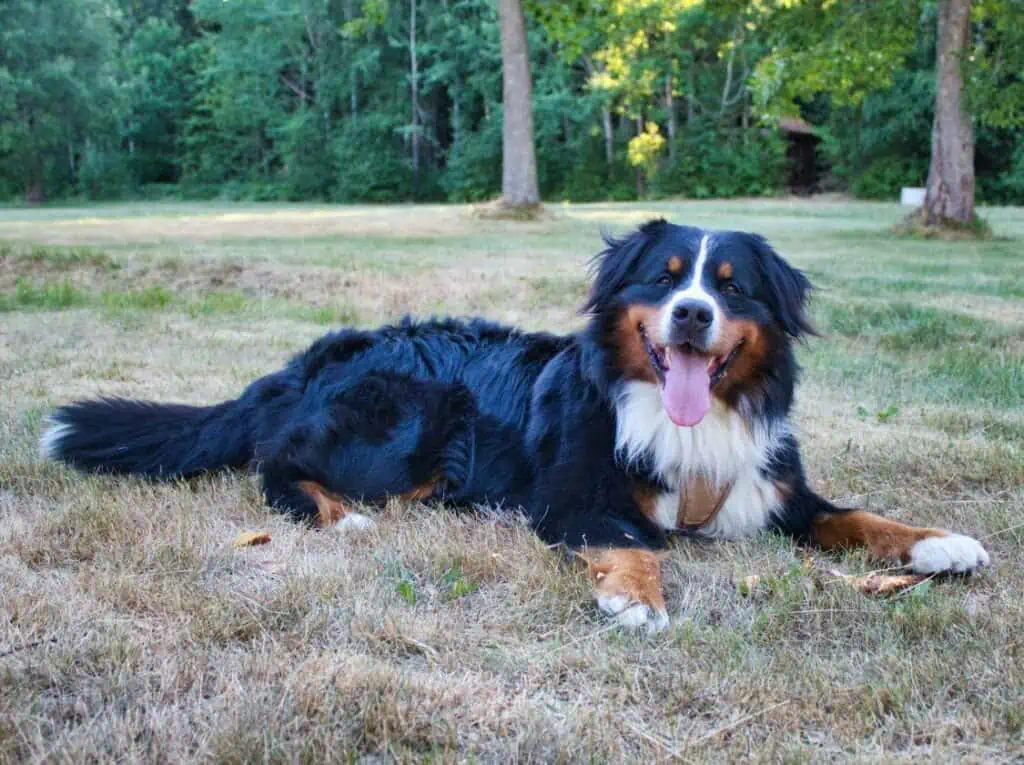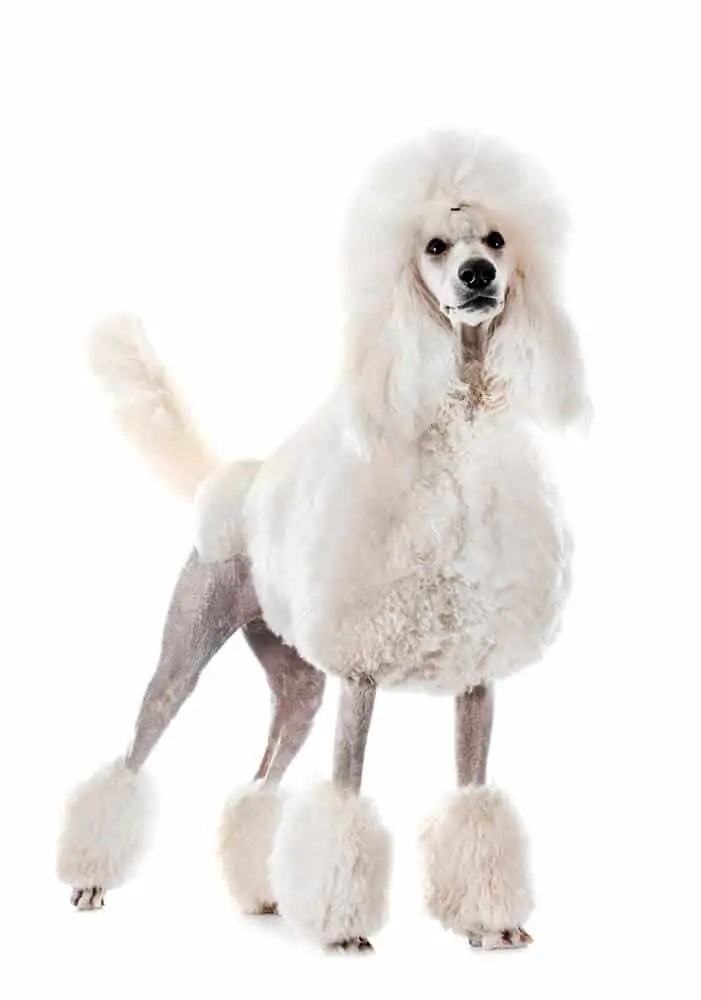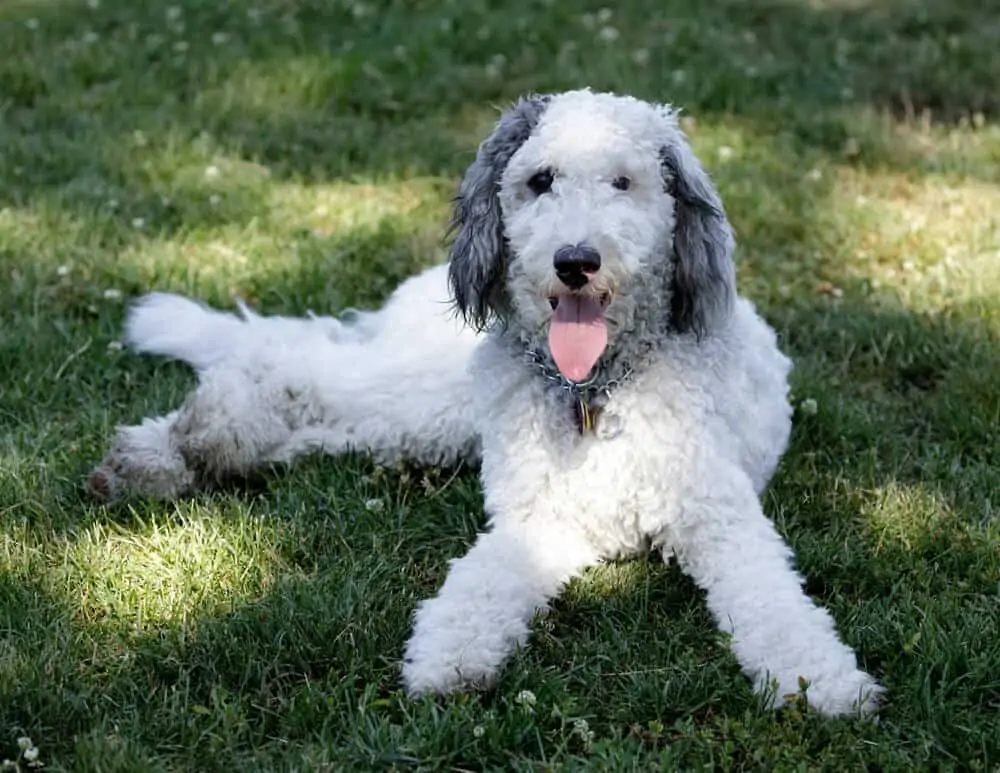Last Updated on
If you are looking for a friendly and easy-going dog to add to your family, you might want to consider the Bernedoodle. However, Bernedoodles aren’t for everybody.
In this article, you’ll learn more about this Doodle-type dog, including who should get a Bernedoodle and who shouldn’t.
| Bernedoodle Dog Breed Facts | |
| Height | 15-29 inches |
| Weight | 50-90 lbs |
| Lifespan | 12 years |
| Temperament | Friendly, faithful, and social |
What’s a Bernedoodle?

Some think a Bernedoodle is a cross between a Saint Bernard or a Border Collie, but that’s not the case. A Standard Bernedoodle (also known as a Bernese Mountain Poo, Bernese Mountain Doodle, or a Bernese Poodle) is a designer breed that is actually a cross between a purebred Bernese Mountain Dog and Poodle.
Bernedoodles were first bred in Canada in 2003 by Sherry Rupke. They quickly rose to popularity for being a large hypoallergenic dog with a cute and playful personality. Since then, other people have begun breeding Bernedoodles so more people can enjoy them as family pets!
Personality and temperament of Bernedoodles
Overall, a Bernedoodle is intelligent, playful, and sometimes stubborn! We can further understand a Bernedoodle’s temperament by looking at Bernese Mountain Dog and Poodle’s personality traits.
Bernese Mountain Dog

Bernese Mountain Dogs are a working dog breed known for their high intelligence level and their loyal and faithfulness towards its owner. Bernese Mountain Dogs were originally bred in the Swiss Alps as farm dogs.
They are hard-working, docile, and love to be near their families. As a result, they may experience separation anxiety if left alone for too long.
Bernese Mountain Dogs can be a little apprehensive towards strangers, but they will start to warm up with them once it gets comfortable with their presence.
Also, while the dog can be playful, they are gentle giants making them a popular dog breed for families with children. The only caveat here is that the Bernese Mountain Dog can be stubborn; therefore, you must be patient and consistent with training!
Standard Poodle

Ah, the quintessential Poodle. Poodles are one of the more popular dog breeds globally, and its traits explain why it is so popular with us.
Poodles are known for their intelligence as well as their high energy levels.
They can jump pretty high too, and when you factor in their playfulness, you can expect lots of fun in the house. Being loyal and faithful, the Poodle will love to snuggle and be near you.
One thing to note is that while the Poodle can be playful, their overzealousness can sometimes hurt children by accident. As Bernedoodles can inherit this playfulness, it’s recommended you supervise your Bernedoodle around small children.
Bernedoodle

Loyal
Bernedoodles are loyal and protective of their families. Like their Bernese Mountain Dog parent, they don’t like to be left alone and would do best with families who are home often.
Intelligent
Bernedoodles are highly intelligent. They catch on fast to commands and are easy to train. Bernedoodles have a great memory and are excellent problem solvers, which makes them perfect for activities like obedience, K9 nose work, and agility.
Friendly
This dog breed is known for its affectionate and friendly nature, making it the perfect addition to any family.
Social
The Bernedoodle is a people-oriented dog who loves to be around humans and other animals. However, the Bernese Mountain Dog can be aloof towards strangers and this trait might rub off onto the Bernedoodle. To help mitigate this, we recommend you socialize your Bernedoodle puppy from a young age. It will help them develop socialization skills that will be useful in shaping their personality and temperament!
Bernedoodle appearance
Coats
Like most Doodle dog breeds, Bernedoodles resemble either parent and can inherit the coat type of the Poodle, the Bernese Mountain Dog, or a combination of the two.
When it comes to coat texture, Bernedoodles range from straight hair, wavy, or curly. With Poodle mix dogs, it’s impossible to predict their coats before they are born, so it’s always a surprise (even to the breeder!).
Typically, Bernedoodles are non-shedding, but breeders can’t predict whether their puppies will shed or not. However, most Poodle mix dogs tend to not shed.
A white with grey Bernedoodle
Colors
A Bernedoodle may come in the Bernese Mountain Dog’s tri-color of black, white and brown coat.
It’s also possible for a Bernedoodle puppy to inherit coloring from the Poodle and can be black and white, black and brown, even spotted.

These colors tend to be rare, and Bernedoodles usually come in the standard brown, white and black tri-colored coat similar to the Bernese Mountain Dog.
Size
The Bernedoodle can come in three different sizes determined by the Poodle used for breeding:
- Toy/Tiny/Micro Bernedoodles: The Tiny Bernedoodle is the smallest variant of the Bernedoodle can you can ever get. It stands 8 to 10 inches tall while weighing less than 10 pounds. Having said that, it is pretty rare to find tiny or toy Bernedoodles as they are challenging to breed. Often, a Tiny or Micro Bernedoodle is a Mini Bernedoodle bred with a Toy Poodle.
- Mini Bernedoodles: Mini Bernedoodles are 10 to 15 inches tall and weigh 10 to 30 pounds. A Mini Bernedoodle is from breeding a Toy Poodle or Miniature Poodle with a Bernese Mountain Dog.
- Standard Bernedoodles: The Standard Bernedoodle ranges from 15 to 29 inches tall while weighing 50 pounds and above. This is pretty similar to the size of the Bernese Mountain Dog. Standard Bernedoodles are from breeding a Standard Poodle with a Bernese Mountain Dog.
Note: the above serves as a guide. Your breeder can help you understand the size they estimate their litter will be.
Types of Bernedoodles
There are a few different types of Bernedoodle:
- F1 Bernedoodle dogs: A Bernese Mountain Dog bred with a Poodle (also known as first generation)
- F1B Bernedoodle dogs: A Bernedoodle bred with a Poodle
- F2 Bernedoodle dogs: Two F1 Bernedoodles bred together
- F2B Bernedoodle dogs: An F1 and an F1B Bernedoodle bred together
If you need a non-shedding dog, you should try to find an F1B Bernedoodle. F1B Bernedoodles have more Poodle genetics and are likely to have a non-shedding curly coat.
Energy levels of Bernedoodles
Because of their size and energy levels, daily walks and exercise are a must.
To keep your pooch (and yourself) from getting bored, mix it up with different activities! If you live near hiking trails, take your Bernedoodle on a scenic trek. If you live near water, try swimming or playing fetch in the water.
These activities not only keep your furry friend fit, but they also strengthen the bond between you and your Bernedoodle.
Training
As mentioned before, Bernedoodles inherit a high level of intelligence from both their parent breeds, but the Bernese Mountain Dog can also be stubborn. To effectively train your Bernedoodle, we suggest keeping each training session short and diverse.
This helps prevent your furry friend from becoming bored and losing interest in the training. Shorter training sessions also allow for more frequent reinforcement of good behavior, leading to quicker progress.
Remember to be patient and consistent, and always use positive reinforcement methods.
Grooming a Bernedoodle

Like all Poodle mix dogs, Bernedoodles require lots of brushing and grooming.
A low shedding coat is a lot of maintenance. All the time you’re saving by not needing to vacuum or sweep up dog fur will be spent brushing and grooming your Bernedoodle.
If you do not brush your Bernedoodle, they will get painful knots and tangles which can eventually lead to skin infections and rashes, so it’s crucial you spend enough time combing and brushing your Bernedoodle’s hair.
By grooming your Bernedoodle regularly, you can also create a deeper bond between you and the dog. As for trips to the groomers, you can anticipate taking your Bernedoodle to the groomers every six to eight weeks.
Pro tip: We recommend combing the dog’s coat in the morning when you are feeding it as it helps create a disciplined routine for you and makes grooming a rewarding experience for you dog.
How much do Bernedoodles cost?
Although Poodle mix dogs aren’t purebred dogs, they still come with a high price tag.
Many people wonder, “why are Bernedoodles so expensive?” Bernedoodles are expensive because of the high demand for this beautiful pup. A reputable breeder will also spend lots of time and money caring for the parent dogs and puppies, which factors into the cost.
Bernedoodles can start at around $2,500 and go as high as $5,000. A Tiny Bernedoodle will cost significantly more than a Standard Bernedoodle since the demand is usually higher.
You might also pay more for your Bernedoodle if you want a tri-colored one. These ones tend to be more popular than solid color Bernedoodles. However, we think all Bernedoodles are perfect regardless of their markings!
Health problems
Bernedoodles share some health concerns with their parent breeds, the Poodle and Bernese Mountain Dog, including:
- Hip and elbow dysplasia: common in larger dogs and can cause joint pain and mobility issues.
- Progressive retinal atrophy: a genetic eye disease that can lead to vision loss or blindness
- Epilepsy: a neurological disorder that causes seizures.
- Bloat (gastric torsion): a life-threatening condition where the stomach twists, cutting off blood flow and leading to shock. Common in broad-chested dogs like Poodles and Bernese Mountain Dogs.
- Thyroid issues: can cause weight gain or loss, fatigue, and skin problems.
- Allergies: can cause itching, rashes, and respiratory problems.
You can avoid health issues by taking your dog to the vet regularly, making sure they get lots of exercise, and feeding them a high-quality diet.
Life expectancy
The life expectancy of a Bernedoodle can range. Bernese Mountain Dogs tend to only live to about seven years of age. Luckily, because of the Poodle parent for the Bernedoodle, their life expectancy is increased.
Bernedoodles can be expected to live up to 12 years old. Smaller Bernedoodles, like the Mini Bernedoodles, tend to live even longer.
Where to find Bernedoodle puppies

It’s important to find a reputable Bernedoodle breeder. Reputable breeders will take the necessary steps to screen the parent dogs for any health issues to minimize the chance of them passing them down to their puppies.
You can also search through Doodle rescues to find Bernedoodles and other Doodle dogs up for adoption and in need of a home!
Why the Bernedoodles might not be the dog for you

While the Bernedoodle is a great dog, there are a few reasons why they might not be the right dog for you:
- Bernedoodles are prone to separation anxiety: Because they like to be around their pack, they can get anxious when left alone for too long. If you work long hours, this could be a challenge. You can combat this by signing your dog up for daily doggy daycare.
- Bernedoodles require lots of daily grooming and trips to the groomers: If you don’t think you’ll enjoy brushing your dog often, they might not be the right dog for you.
There are many Doodle mix dogs. Click here to learn about the different (and rare) kinds!
Conclusion
Many owners fall in love with their Bernedoodle dogs. Bernedoodles are great for active families who want to bring their dogs on many adventures. Although they don’t shed, they require lots of grooming. If you’re thinking of getting a Bernedoodle, make sure to check rescues near you or to find a reputable breeder.
FAQs
Bernedoodles range from 15-29+ inches and usually weigh more than 50 pounds.
Bernedoodles make great family dogs. As the Bernedoodle loves to be around family, it’s important to work on socializing your Bernedoodle so they do not get separation anxiety when you leave the house.
No, Bernedoodles are not lazy. Bernedoodles have a moderate-energy level and enjoy going for walks and playing with their family.
No, Bernedoodles are not recognized by the American Kennel Club (AKC) as they are not purebred dog breeds. They are, however, recognized by the American Canine Hybrid Club and Designer Dogs Kennel Club.
There are many misspellings of “Bernedoodle”. The correct way to spell it is “bernedoodle”. Common misspellings include bernidoodle, bernadoidle, beredoodle, bernerdoodle, and burna doodle.
This article may include affiliate links. www.travellingwithadog.com is a participant of Amazon.com Services LLC Associates Program. As an Amazon Associate, I earn a commission from qualifying purchase. www.travellingwithadog.com participates in other affiliate programs, and recieves commissions when purchases are made through the links. The cost is not inflated to account for the commission earned.
Veterinary Disclaimer: travellingwithadog.com is not a substitute for veterinary advice and does not intend to provide any type of veterinary advice for your animals. Please consult your vet for any questions you have regarding your pets health.

About the Author:
Dana owns a Sheepadoodle and a rescue merle Labradoodle. Her first dog growing up was a white Toy Poodle and she’s loved dogs ever since. She has years of experience fostering dogs and has helped find homes for a variety of different breeds, both large and small! After seeing so many dogs end up unwanted and in shelters, she began blogging about different dog breeds (specifically Doodle dogs, since that’s what she knows best) to help people make informed choices when adding a new member to their family.
When Dana’s not brushing her Doodles’ hair (it takes a lot of time for two!) you can find her playing nose work games and fetch with her two amazing pups.
Learn more about her here.


Love bernadoodles
Bernedoodles are such an adorable breed of dogs. Some of my neighbors and coworkers have them and they’re such goof-balls and so much fun!
My Bernedoodle puppy is about 14 weeks. He is being fed three full cups of dry dog food suggested by the breeder. He still seems ravenous. Could I be underfeeding him and how do I know ?
Please reach out to your vet to confirm how much to feed your dog as it’s not something we can answer online. There can be many reasons why your dog is still hungry after eating (i.e., the food is not meeting nutritional requirements, diseases and illness) so it’s best to get a professional opinion!
The article doesnt mention the barking. I have a 5 yr old bernedoodle. I got her as a puppy. She barks excessively. I have read that it is common for the breed, is that true or is my dog an anomaly?